
All iLive content is medically reviewed or fact checked to ensure as much factual accuracy as possible.
We have strict sourcing guidelines and only link to reputable media sites, academic research institutions and, whenever possible, medically peer reviewed studies. Note that the numbers in parentheses ([1], [2], etc.) are clickable links to these studies.
If you feel that any of our content is inaccurate, out-of-date, or otherwise questionable, please select it and press Ctrl + Enter.
Ointments for acne stains
Medical expert of the article
Last reviewed: 03.07.2025
The appearance of pigment spots after acne is, of course, not a disease. However, this phenomenon can be called an extremely unpleasant cosmetic problem that causes a lot of trouble to its owner. How to get rid of such a problem? Of course, the best ointment for spots after acne can only be recommended by a medical specialist (in this case, a dermatologist). We offer you a brief overview of the most common means for getting rid of spots. Such products can be purchased at any pharmacy, and in most cases they are not that expensive.
ATC classification
Pharmacological group
Pharmachologic effect
Indications ointments for acne spots
Acne spots are nothing more than excess accumulations of the pigment melanin, a dark skin pigment. This happens when there is a fairly pronounced or long-term inflammatory process in the tissues.
Post-acne spots can be divided into several types:
- bluish-dark spots, even crimson - appear after severe inflammation of the skin, after boils and massive deep acne eruptions. Such an intense color of spots is the most difficult to remove - treatment can be long and complicated;
- reddish and bluish-red spots from acne are a mild degree of inflammation. Such marks are most often temporary and disappear on their own. Only in some cases may short-term treatment be necessary;
- acne spots - may be accompanied not only by darkening of the skin, but also by the formation of scars, which are not so easy to remove. In addition to ointments for acne spots, deep skin peeling may be needed.
Acne spots do not always appear. Most often, this occurs as a result of improper removal of rashes:
- if skin disinfection is insufficient;
- in advanced acne conditions;
- when squeezing pimples;
- if the skin around acne is damaged.
To prevent spots from forming, acne treatment must be started promptly and correctly.
 [ 1 ]
[ 1 ]
Release form
This form of release, such as ointment, can affect acne spots in different ways.
- Ointments with a lightening effect are produced with the addition of hydroquinone, a substance with a bleaching effect. Such products eliminate hyperpigmentation well, but they should be used moderately, in short courses. Otherwise, the structure of cells may change, which can lead to serious diseases, including malignant tumors. In addition, the combined use of hydroquinone and vitamin preparations based on retinol is not recommended.
- Ointments with water-soluble and fat-soluble hydroxy acids are capable of qualitatively exfoliating the surface layers of the skin, which helps to reduce the severity of hyperpigmentation. Such ointments include preparations based on salicylic, citric, glycolic and lactic acids.
- Anti-acne ointments contain the active substance azelaic acid, which is excellent for hormonal rashes (for example, acne during puberty). With ordinary pimples, this substance will not bring the expected effect.
- Ointments based on kojic acid, arbutin or magnesium ascorbyl-2-phosphate – substances that actively inhibit the synthesis of melanin.
Names
Pharmaceuticals that act against the formation of acne spots include the following drugs:
- antiseptics - ichthyol and streptocide ointments - have antimicrobial and disinfectant effects;
- antibacterial drugs – Levomekol, Zinerit ointments, etc. – relieve the inflammatory reaction;
- hormonal agents – Lorinden A, Flucinar – eliminate inflammation and correct metabolic processes in tissues;
- Antihistamines – Fenistil, Elidel – eliminate pigmentation caused by an allergic reaction.
Additionally, it is worth highlighting other effective ointments for acne spots:
- heparin ointment;
- badyaga;
- contractubex;
- syntomycin ointment;
- zinc ointment;
- sulfur ointment, etc.
 [ 2 ]
[ 2 ]
Ointments That Lighten Acne Spots
An ointment for acne spots may consist of components with different bleaching properties. Some of them are completely harmless to the body, but some can be toxic - for example, hydroquinone. Instead, arbutin is now actively used - a similar bleaching substance that does not pose a danger to the body.
Sulfur-based ointment for acne spots also has a lightening and exfoliating effect. However, when choosing such an ointment, you should pay attention only to those products in which the sulfur content is at least 10% - only such preparations can effectively whiten areas with hyperpigmentation.
If the ointment contains mercury, it can also have a whitening effect, but such an ointment, in addition to being beneficial, often brings a lot of harm to the body due to its toxicity.
It is good if the composition of the ointment for spots contains the component melanozyme - this is a specific natural enzyme that is capable of destroying the persistent bonds of melanin, which are accumulations of pigment in the surface layers of the skin.
Professional acne scar treatments often contain kojic acid, a harmless substance that exfoliates the surface layer well. The downside of kojic acid is its ability to cause allergic reactions.
Zinc Ointment for Red Spots After Acne
Zinc ointment is an inexpensive and effective product based on zinc oxide and vaseline oil. The ointment has a drying and tanning effect, eliminates residual signs of an inflammatory reaction.
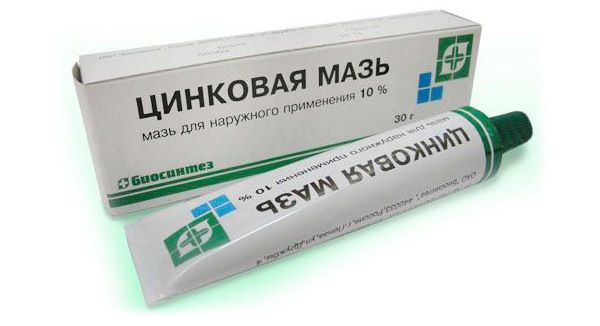
Zinc ointment is used for a large number of skin problems:
- for diaper rash;
- in case of diathesis;
- for superficial skin injuries.
In addition, this remedy is actively used to get rid of red spots after acne. The ointment is applied to the spots daily, minimum 4 times, maximum 6 times a day. Duration of treatment is until the hyperpigmented areas disappear completely.
The only contraindication for using zinc ointment to combat skin spots is excessive allergic sensitivity to the composition of the external agent.
Salicylic ointment
Salicylic ointment is suitable for the treatment of many skin diseases. This drug is obtained on the basis of salicylic acid.
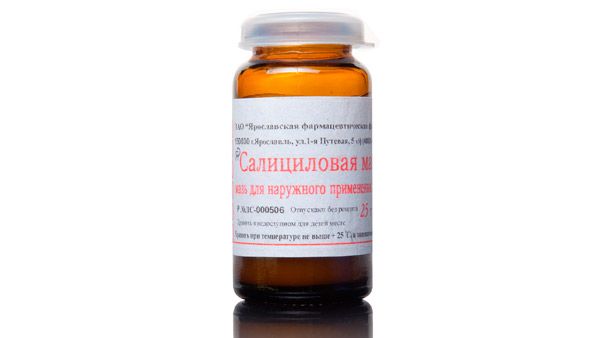
Salicylic ointment has an anti-inflammatory effect, which allows it to be used to treat eczematous rashes, purulent skin lesions, seborrheic rash, warts, psoriatic plaques, prickly heat and ichthyosis. Salicylic acid is a keratolytic, which explains the good exfoliating and renewing properties of the drug.
The ointment for combating acne spots is applied to problem areas once a day (at night). The preparation is used daily for a week, after which they switch to applying it every other day. Additionally, moisturizing creams are required, since the ointment has a significant drying effect.
If you cannot buy salicylic ointment, you can use a regular salicylic acid solution. These products have much in common, and their effectiveness is almost the same. However, if you have dry and sensitive skin, such products will not suit you, as they dry the surface of the skin very much, which can negatively affect the condition of the epidermis.
Synthomycin ointment
Syntomycin ointment is a long-standing, proven remedy for pigment spots, including those caused by acne. The ointment contains an antimicrobial agent, the antibiotic chloramphenicol, and castor oil, an antiseptic and a mild skin lightener.
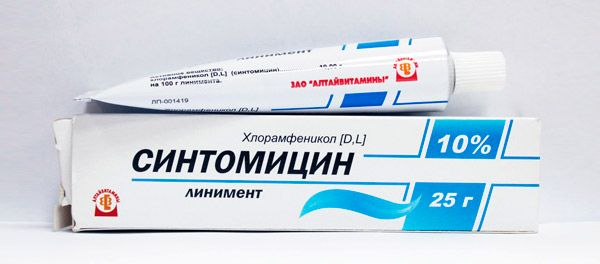
The ointment is applied every other day, preferably under a plaster or bandage.
Syntomycin ointment is not recommended for use during pregnancy, in cases of high risk of allergies, or in cases of eczema or fungal infections (mycosis, candidiasis).
In addition, this acne scar treatment should not be used for a long period of time, as the ointment may cause an addictive effect, which will significantly slow down and complicate the cleansing of the skin.
Heparin ointment
Heparin ointment is often used for thrombosis, varicose veins, hemorrhoids. However, few people know that heparin is no less effective for hematomas, dark circles under the eyes, and spots on the face and body after acne.
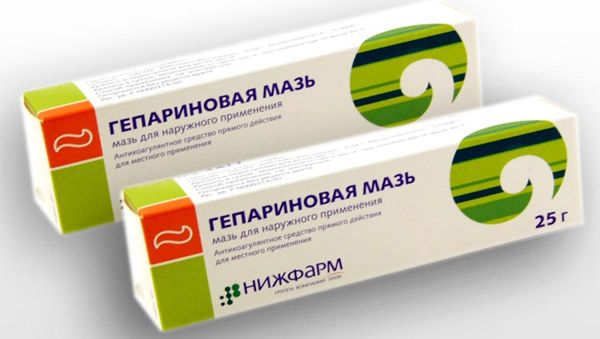
The main ingredient of the drug is sodium heparin, a carbohydrate substance that affects blood clotting, platelet quality and blood circulation. Additional ingredients in the ointment include vaseline oil, glycerin, stearin, benzocaine, etc.
Heparin ointment is used in small quantities, applied to problem areas up to three times a day. It should be taken into account that the effect of heparin continues for 8 hours after applying the product to the skin.
As a rule, 10 days of using the ointment is enough to improve the skin condition. However, if additional rashes, itching, redness appear, it is better to stop using the product.
It is not recommended to use the ointment on open wounds and damage to the integrity of the skin, as well as in cases of poor blood clotting.
Ichthyol ointment
One of the natural and inexpensive remedies for getting rid of acne spots is ichthyol ointment - a substance containing shale resins and organic sulfur.
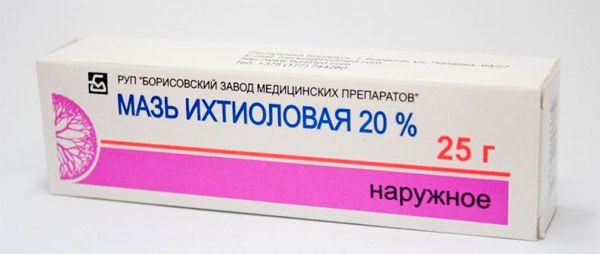
The ointment cleanses the skin, stops the development of the inflammatory reaction, disinfects, softens, and promotes the restoration of the superficial epidermis.
In addition to removing acne spots, ichthyol ointment can be used:
- directly for pimples and acne breakouts;
- for redness and irritation of the skin;
- for sunburn;
- for rough and keratinized skin.
To get rid of spots after acne, the ointment is applied at night, under a plaster or bandage. The duration of use is determined by the depth and severity of the pigmented areas.
The ointment is not used:
- with the combined use of iodine preparations;
- if you are prone to allergies;
- during pregnancy (not recommended).
It is not recommended to apply the product to large areas of skin. If the hyperpigmentation area is extensive, it is better to use point application of the ointment - directly to the places where acne occurs.
Sulfur ointment for acne spots on face
In order to remove acne spots with sulfur ointment, you need to take a product with a sulfur concentration of at least 10%. A lower concentration will not cope with the exfoliation of old skin cells. In general, sulfur ointment is quite effective in the fight against hyperpigmentation, and the cost of such a product is pleasing.
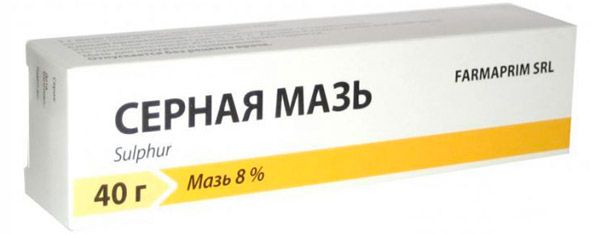
However, this ointment is not without its drawbacks:
- not very pleasant aroma of the product;
- difficult to wash off from skin;
- does not wash off if it gets on clothing fabrics.
Sulfur ointment is applied to a previously moistened face (to the affected areas) once every two days. The duration of treatment is usually 3-4 weeks.
Sulfur preparation should not be used:
- during pregnancy;
- if the body is prone to allergies.
If you are not sure that the product is completely safe for you, conduct a test: apply a small amount of ointment to the wrist area and wait. If during this period there is no redness, itching or discomfort, then you can use the product to get rid of spots on the face.
Pharmacodynamics
In order to achieve the expected whitening effect, the ointment for acne spots should have the following properties:
- stop the inflammatory process - this property is especially important if, in addition to the spots, there are also pimples that need to be treated (otherwise the spots will appear again);
- disinfect the skin, neutralize bacteria - to avoid recurrence of acne and prevent the development of an infectious process;
- exfoliate the surface layer - this is the main bleaching effect, when old, pigmented cells are exfoliated, in place of which new, healthy ones appear. This property is called keratolytic in medicine.
An ointment can have one action or combine different properties, which only improves the effectiveness of the drug.
Pharmacokinetics
The kinetic properties of ointments are determined by the active ingredients, they determine the depth of penetration of the drug into the tissues. Ointments for spots do not enter the systemic blood supply, so it is not possible to describe the effect of such products on the body.
Some drugs can be found in the bloodstream in minute quantities (approximately up to 5% of the total amount of the active ingredient), which has no clinical or pharmacological significance.
Dosing and administration
Before starting the procedure, it is necessary to clean and prepare the skin surface to which the preparation will be applied. If there are crusts, they are carefully removed, the skin is washed and disinfected.
Apply the ointment for acne spots according to the instructions, from 1-2 times a day to 2-3 times a week.
The ointment can be applied to the skin and left until completely dry. However, some preparations recommend applying under a plaster or bandage: in this case, you may need a bandage, gauze or adhesive plaster of the appropriate size.
The duration of skin lightening procedures is from 10 days to 4 weeks.
Use ointments for acne spots during pregnancy
If it is proven that the components of the ointment used do not enter the systemic blood supply, then the use of such a drug during pregnancy is allowed. However, the ointment must be used with caution, avoiding contact with mucous membranes, eyes and mouth, as well as the skin of the mammary glands (which is especially important for nursing women).
The use of certain medications is especially dangerous in the first half of pregnancy. These include sulfur, ichthyol and heparin ointments.
Mercury-based ointments for acne spots are absolutely contraindicated during pregnancy.
To summarize the above, it should be noted that it is very important to carefully read the composition of the ointment before use, so as not to harm the unborn child and not to jeopardize the development of the pregnancy itself.
Contraindications
Contraindications to the use of ointments for acne spots may include:
- superficial skin lesions, ulcers, injuries;
- fungal skin diseases at the site of drug application;
- subcutaneous hemorrhages (when applying heparin ointment);
- skin diseases (eczema, psoriasis);
- necrosis of superficial or deep tissues;
- period of pregnancy and breastfeeding;
- childhood;
- increased sensitivity of the body to the composition of the selected drug.
 [ 8 ]
[ 8 ]
Side effects ointments for acne spots
Side effects when using ointments for acne spots are rare. This may include itching at the site of application, a short-term burning sensation, dry skin, peeling (which is quite normal), skin irritation, contact dermatitis, allergic reactions (urticaria, swelling, redness of the skin).
As a rule, any side effects go away on their own after you stop using the chosen ointment.
Overdose
Using acne scar creams too often can cause dry, irritated skin.
Some ointments (for example, synthomycin) can cause addiction if overdosed, after which the drug will no longer be useful for lightening the skin.
It is recommended to use the dosages of the drugs in accordance with the scheme prescribed by the doctor. If you use the ointment yourself, then carefully read the instructions beforehand. And it is even better if the treatment is carried out under the guidance of an experienced dermatologist or cosmetologist.
Interactions with other drugs
Interactions of difficult to combine external preparations are possible - this depends on their composition and the method of action on tissues. Some interactions are difficult to predict: this mainly applies to biologically active additives and external preparations of plant origin.
If there are doubts about the compatibility of a particular drug, then in such a situation it is better to consult a doctor. It is possible that the ointments may not be suitable for joint use.
Keratolytic spot ointments, when combined with each other, can lead to excessive dryness of the skin, which may require further special restorative treatment.
 [ 19 ]
[ 19 ]
Storage conditions
Most ointments for acne spots do not require special storage conditions. For example, it is not necessary to store ointments in the refrigerator: it is enough to place them in a dark place where sunlight does not reach. The optimal temperature for storing ointments is from +20 to +24°C.
Children should not be allowed near places where medicines and cosmetics are stored. Small children may accidentally swallow the product or use it in another way, causing harm to their own health. Even the most seemingly safe ointment may be harmful in this situation.
Some ointments have storage restrictions: for this reason, for optimal preservation and effectiveness of the drug, it is recommended to first read the instructions for a specific external drug.
Shelf life
The shelf life of such a product as acne spot ointment is usually about 3 years, unless the instructions indicate another period. Carefully study the instructions for the drug before starting the procedures.
 [ 22 ]
[ 22 ]
Analogs and similar preparations
Attention!
To simplify the perception of information, this instruction for use of the drug "Ointments for acne stains" translated and presented in a special form on the basis of the official instructions for medical use of the drug. Before use read the annotation that came directly to medicines.
Description provided for informational purposes and is not a guide to self-healing. The need for this drug, the purpose of the treatment regimen, methods and dose of the drug is determined solely by the attending physician. Self-medication is dangerous for your health.

